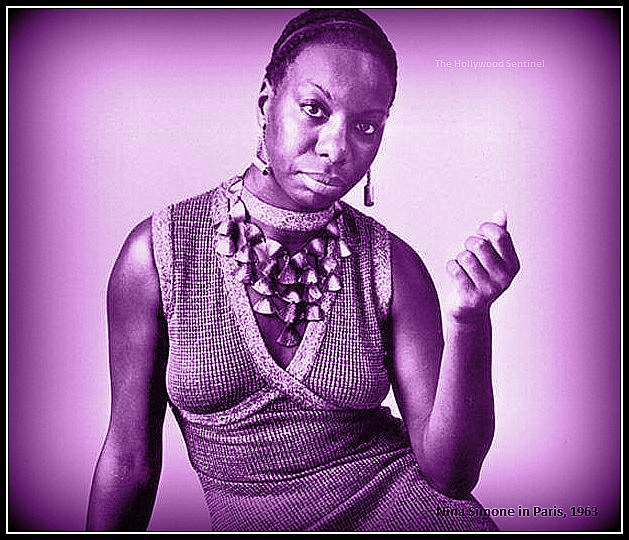What makes a diva? A diva is a female chanteuse, a vocalist whose name evokes more than celebrity, the level of icon. Sometimes it is the voice, sometimes it is the personality, the love affairs, the tragedy … and in the case of Nina Simone it is all this and more. It is the soul, the soulfulness. But all this is reflected in the voice. There is no form of expression in which a human being is more naked than singing. The Nina Simone mystique was created as an extension of THAT voice, the voice of a veritable goddess of jazz.
I just picked up, I Put A Spell on You: An Autobiography of Nina Simone, this morning, and I couldn't put the book down until I had finished. I learned that Nina was raised in a small town in North Carolina named Tryon, a resort town where blacks and whites lived in a “checkerboard” fashion rather than having a “black” side and a “white” side of town. While Nina's career in the seventies took her to the center of the Black Power movement in the U.S., her musical roots started in her mother's Methodist church where Eunice Waymon (Nina's birthname) began to play piano and was quickly known as a prodigy.
A white woman who Nina's mother worked for in a domestic capacity paid for Nina to receive formal piano training, and when that fund ran out, the piano teacher, a Russian named Mrs. Massinovitch, who Nina called Mrs. Massy, started a fund for Nina's continued education which eventually took her all the way to Julliard. The whole town worked together to give Nina's talent the nurturing she deserved.
Nina's first goal was to become a world renown classical pianist. Her early years were spent playing Bach, hours at a time, to the exclusion of having a normal childhood or giving in to the temptation of young love. The burden of greatness and others' expectations, as well as the pressure of being from a family that struggled financially in addition to being black, all pushed Nina to work harder than anyone to master her craft. Her scholarship to Julliard was a one-year deal, and she expected to gain admission to the Curtis Institute of Music in Philadelphia, but was rejected.

Nina, not unlike other gifted and sensitive people before and after, took the rejection to heart, barely speaking for three days. (According to her daughter, Simone, the Curtis Institute agreed to give Nina an honorary diploma shortly before her death.) Eventually, she made ends meet accompanying vocal students during lessons on behalf of a voice teacher, and then started playing piano in dingy little clubs to raise money to continue her classical studies. One of the bar owners demanded she sing as well, and she only did so to keep the job. Nowhere in her autobiography does she acknowledge that beyond musical talent, she had, also, an extraordinary voice.
Nina's voice is one of, if not the most powerful, distinguishable, iconic recorded voices of all time. She could call you out, whisper in your ear, make you break down in tears or fall down on your knees. She was known as “difficult” and pushed herself, regularly, so hard that she exhibited effects of nervous exhaustion which were indistinguishable from those of mental illness, per her own description. Others have been more speculative, describing her as bipolar, or schizophrenic; perhaps it is easier to label her as such than to deal with her radical viewpoint and at the very least eccentric behavior. In her autobiography, she speaks of singing as very physically demanding and of not being able to wind down for hours after a performance, until the sun was coming up. She talks about getting angry and behaving volatilely mostly in regard to a lack of control over her own performances and schedule due to the demands of various handlers and agents. Married twice, her second husband, Andrew Stroud, became her manager and pushed her relentlessly from concert to concert. She largely credits his strategic planning for building her into a global superstar, though she admits to a singular incident of domestic violence prior to their marriage.
As a small town, highly religious girl with a penchant for Bach, Nina's transformation to sultry jazz singer was a little uneasy. All of the details that add color and contrast to her story are, one hopes, irrelevant in light of her remarkable genius and legacy. If you have never heard Nina Simone or you have heard her a thousand times, there's always more to love from listening to one more song. Here below is one of my favorites, “Wild is the Wind.”
This story is ©2013, Moira Cue / The Hollywood Sentinel, all world rights reserved.
